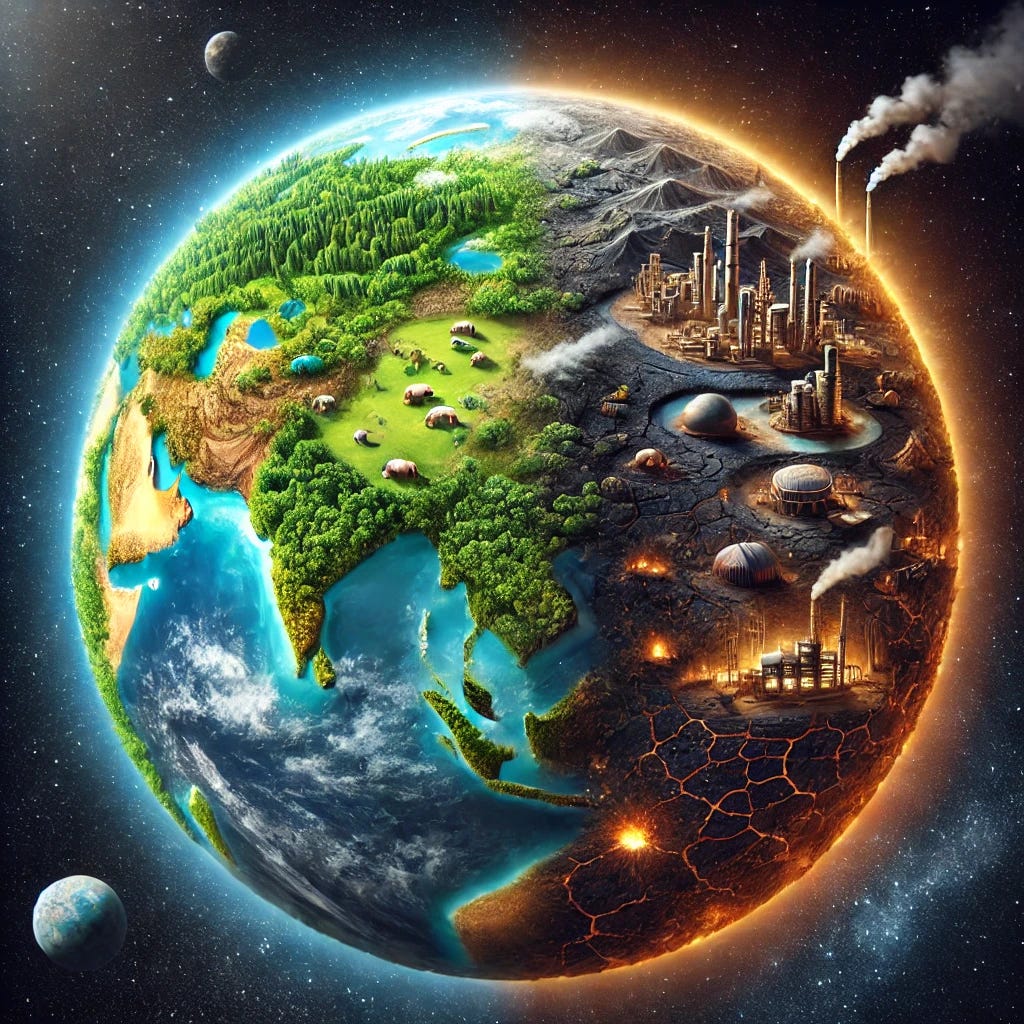Carrying capacity, the maximum population size an environment can sustain without degrading natural resources depends on consumption rates and waste production. Unfortunately, the resources we're depleting are not replaceable, and this stark reality is largely ignored. This lack of awareness is a primary driver of irreversible and severe environmental degradation, resource depletion, and self-destruction. Once these resources are gone, they're gone forever, and we must prevent that from happening.
To understand the implications of overshooting Earth’s carrying capacity, one must first acknowledge the principal role of natural resources in sustaining human life. Water, food, and energy are fundamental to our existence. As global populations continue to grow—projected to reach nearly 10 billion by 2050—the stress on these essential resources increases. Our current farming practices rely on intensive agriculture and consume excessive amounts of water and land, which are rapidly dwindling. The excessive use of fertilizers and pesticides has led to soil degradation, compromising future agricultural viability.
Human activity's ecological footprint has expanded dramatically in the last few decades, made worse by unsustainable consumption patterns. The Global Footprint Network reports that humans now use the equivalent of 1.6 planets to support our current lifestyle, thus creating a severe imbalance. Overconsumption drives habitat loss, climate change, and species extinction, threatening the systems that sustain life on Earth. Our behavior has serious consequences, manifested in extreme weather events like those we have been experiencing lately, dwindling biodiversity becoming increasingly apparent, and increased social unrest.
Multiple factors can contribute to the lack of awareness surrounding these issues. In the United States, we tend to disconnect from nature. Urbanization and technological innovations have created a lifestyle that isolates us from the environmental realities prevalent outside our immediate surroundings. Consequently, many of us must become aware of the impacts of our consumption habits locally and globally.
We must recognize the role of education in shaping awareness. While some schools and institutions have begun to integrate environmental sciences into their curricula, widespread educational activities are necessary to increase our awareness and understanding of the need to behave in a manner that supports ecological sustainability. We must be informed about the current state of Earth’s resources and empowered with knowledge to make sustainable choices. It's crucial to emphasize that without fundamental changes in personal behavior, denial and apathy toward the environmental crises will continue progressing to the end. Our actions matter, and they can make a difference.
Public narratives and discourse are often driven by short-term economic concerns, disguising the long-term consequences of sustainable practices (delay discounting) and reinforcing a cycle of exploitation. Addressing the problem of delay discounting requires a shift in our behavior to focus on long-term sustainability as a core value of society.
The lack of awareness regarding our surpassed carrying capacity directs humanity toward an abyss of self-destruction. Recognizing the finite nature of Earth’s resources is crucial for shaping and engaging in sustainable behaviors that preserve and value the environment. It also creates a culture where people frequently engage in prosocial behaviors that benefit the culture. Fostering education, promoting public awareness, and cultivating a culture that values and rewards collective responsibility are essential steps toward steering our world from impending disaster. Humanity stands at a precipice, yet with informed actions, we can steer our behaviors toward sustainable, cooperative practices that foster prosperity on our planet.
Thanks and please pass it on.
Francisco & Faris





